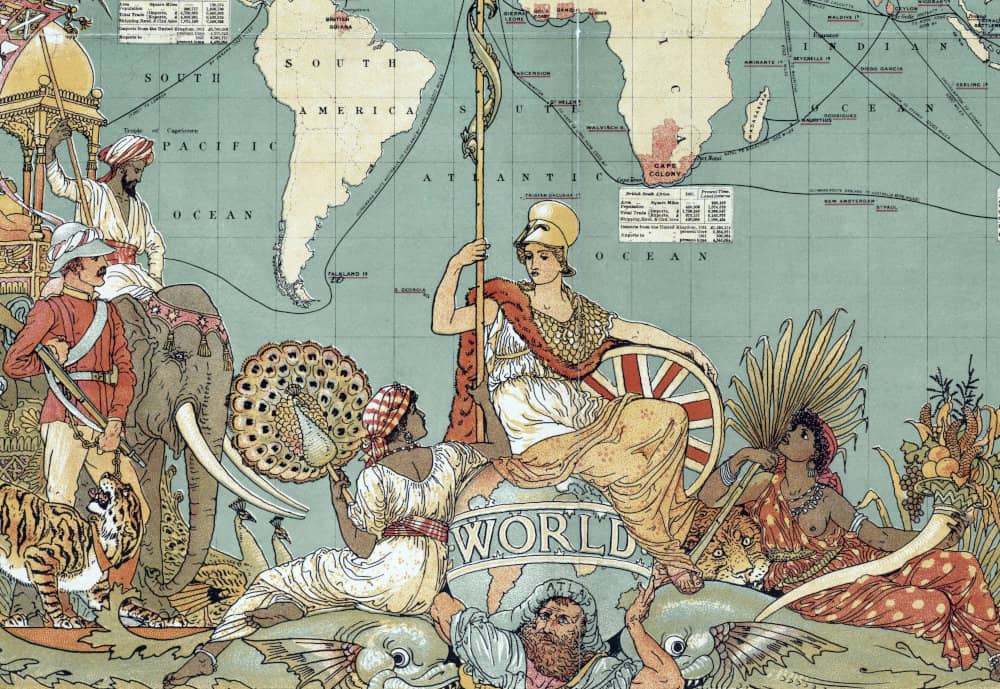As power evolves into the 20th century, it is always helpful to remember that an imperial lens is the one sure perspective or paradigm that never fails throughout history. Empires may recede, reform, regenerate, and even rebrand themselves, but they eventually emerge in new forms, something that we can be sure of.
In 2007, Herfried Munkler published one of the finest historical works in recent years with his superbly argued Empires: The Logic of World Domination from Ancient Rome to the United States. While one could reasonably argue that China is an imperial actor, and that the EU is taking on imperial postures in its regional sphere of power, the USA is widely regarded as an empire, with some who see it as a force for good, while critics see it as a threat to long-term peace and security. The description of the United States as an empire may not be very flattering to its citizens, especially since it was founded as a free republic that broke away from the British Empire in the name of freedom. A careful reading of history shows that Western empires often provide a degree of freedom for their citizens at home, while having no qualms about ignoring or actively oppressing the inhabitants of foreign colonies or imperially governed territory.
In order to develop our understanding of global events and modern history, an imperial lens will pay dividends in helping us to map the territory and demonstrate clear patterns and currents that have a deep influence on public discourse, global policy and the very nature of knowledge itself. While there have been hundreds of empires throughout world history, we want to examine and give closest attention to those which came closest to global empire.
On the opening page of his book, Munkler asks “Does the world depend for its security on a supreme imperial power? Or does that imperial power represent a serious threat to world order, and would it be better if it did not exist?… The world community assembled in the UN has actually relied again and again on the capabilities of the dominant imperial power… it is a long time since the functions and demands of an empire have been systematically thought through.”
His questions could not be timelier, and their importance cannot be overstated. Martin Van Creveld once wrote in The Rise and Decline of the State that
“Globally speaking, the international system is moving away from an assembly of distinct, territorial, sovereign, legally equal states toward different, more hierarchical, and in many ways more complicated structures.” [1]
If we are moving away from state formations and entities, then we are moving towards global governance under the authority of a supreme imperial power as Munkler suggests, a gradual transition that is difficult to detect while the process takes place since it is subtle, incremental and is rarely publicized or critically examined. While the state is often compared to a corporation or a legal entity, able to act as a person and spring into action in a way that may not always be possible to observe, the patterns and especially the words and discourse often reveal the strategies and deeper objectives that mark their real agenda.
By studying empires and the imperial formations and language of the present, we can see that the main course of history is imperial history, and many if not most of the earth’s inhabitants have lived under some type of empire over the last few centuries.
It seems bizarre to a degree that scholars, professors and social commentators can freely investigate empires of the past with precision and intensity, and yet ignore the imperial machine that looms above them and fail to see the origins of how that machine came to be and the current path of its development. Munkler, clear-eyed and objective as ever, directs our attention to where it needs to be – firmly on empires.
“A glance at history shows that, when all is said and done, political models have come down to a choice between state and empire.” (Preface, p. ix)
Other scholars and historians from various disciplines echo the same sentiment, showing us the one eternal paradigm that has shown a remarkable ability to reinvent itself and that never goes out of style.
One is struck… by the sheer durability of empires as political formations, compared to the relatively short time span in which the nation state was the modal form of politics… The empire form has not only been around for a long time, but proved adaptable to the development of capitalism and communism as well, to changing technologies of warfare and new concepts of authority, as well as to reconfigurations of the relationship of land and sea, of contiguous territory and long-distance communications.
(C. Calhoun et al, Lessons of Empire: Imperial Histories and American Power, pp. 8, 13)
…a propensity in human communities has been the accumulation of power on an extensive scale: the building of empires. Indeed, the difficulty of forming autonomous states on an ethnic basis, against the gravitational pull of cultural and economic attraction… has been so great that empire… has been the default mode of political organization throughout most of history.
(John Darwin, After Tamerlane: The Global History of Empire Since 1405. p. 23)
For the greatest part of humanity and the longest periods of history, empire has been the typical mode of government. Empires have no interest in operating within an international system; they aspire to be the international system. Empires have no need for a balance of power.
(Henry Kissinger, Diplomacy. p. 21)
…imperial power and politics… remain very much a part of the contemporary landscape… world history is imperial history.
(Halperin and Palan, Legacies of Empire. p. 2)
By guaranteeing peace and order to the dutifully submissive, and by giving a masterly demonstration of how best to divide and rule, a succession of Persian kings had won for themselves and their people the largest empire ever seen. Indeed, it was their epochal achievement to demonstrate to future ages the very possibility of a multi-ethnic, multi-cultural, world-spanning state.
(Tom Holland, Persian Fire: The First World Empire and the Battle for the West, (preface) p. 8)
Big is back. It is inter-imperial relations – not international or inter-civilizational – that shape the world. Empires – not civilizations – give geography its meaning. Indeed, empires span across civilizations; as they spread their norms and customs, they can change who people are – irrespective of their civilization.
(Parag Khanna, The Second World: Empires and Influence in the New Global Order, Introduction, p. xiv)
Empire comes in many forms, not just in the annexation of territory, the Roman practice, or the creation of colonies, the operating mode of Spain, Portugal, Britain, and other European powers. At its heart, empire involves asserting influence and control over places, people, resources, and trade outside the original boundaries of a national entity. While empires almost always involve at least some use of military force, or threat of its use, power can be exerted in many ways. Political, economic, cultural, and ideological influence can be as important to empire as ships, planes, and guns. (Joshua B. Freeman, American Empire, Introduction. p. x)
Thus it can be seen that through the study of empires, officials, and imperial organization, the processes integral to cultural interaction and exchange can be revealed… how empires and societies do not exist in isolation… Cultural interaction and exchange within empires, moreover, is key to understanding the complexities of all world societies and the human experience from time immemorial.
(F. Kasinec and M. Polushin, Expanding Empires, Cultural Interaction and Exchange in World Societies from Ancient to Modern Times, Introduction, p. xxi)
…historical trajectories are more complicated than a movement toward a nation-state. Empires – self-consciously maintaining the diversity of people they conquered and incorporated – have played a long and critical part in human history… Despite efforts in words and wars to put national unity at the center of political imagination, imperial politics, imperial practices, and imperial cultures have shaped the world we live in… Empire was a remarkably durable form of state… By comparison, the nation-state appears as a blip on the historical horizon, a state form that emerged recently from under imperial skies and whose hold on the world’s political imagination may well prove partial or transitory.
(J. Burbank and F. Cooper, Empires in World History: Power and the Politics of Difference pp. 2-3)
The world community is always determined by the current field of vision and the horizon of civilizations, and therefore more by cultural and technological factors than by geographic factors… The claim of empires to world domination has thus acquired an ever wider reach from antiquity to the present, so that there is now indeed room on the globe for only one empire – in accordance with the feature of uniqueness and distinctiveness on which empires must always insist.
(Herfried Munkler. Empires: The Logic of World Domination from Ancient Rome to the United States. pp. 11-12)
An empire… is not just a “superstate” or a large component of the state system. It is a system of rule that transforms society… The cultural capital developed by empire – its styles, arts and architecture, language – can radiate influence throughout successive centuries… Empires rule by virtue of the prestige they radiate as well by their military might… Empires have justified their supra-ethnic domination by invoking allegedly universal values or cultural supremacy, and have diffused these public goods by cultural diplomacy and exchanges.
(Charles S. Maier, Among Empires: American Ascendancy and its Predecessors, pp. 20, 65)
It is not that history repeats itself. Precisely the opposite: World history develops. Through historical comparison we can see that the most significant problems of our own time are novel.
(M. Mann, Sources of Social Power, Vol. 1, Chapter 1, Societies as organized power networks, p. 32)
Through a careful study of empires and by mining the rich historical record available to us in our global digital age, we can see the grand pattern of history with greater clarity and understanding. The conception of empires as something of the past or some bygone occurrence is short-sighted and naïve. Empires absorb and demolish nation states; this tension, this ever-present reality never recedes or leaves our field of view. Although we have evolved from tribal chiefdoms, the glories and trappings of empire still make it too irresistible a prize not to pursue.
[1] Van Creveld, Martin (1999). The Rise and Decline of the State, Cambridge University Press. p. vii (Preface).



0 Comments